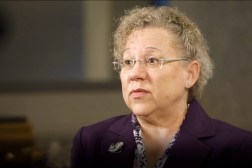Minneapolis CIO Otto Doll prepares to step down, scale back
Minneapolis Chief Information Officer Otto Doll is stepping away from his role with the city later this year, he confirmed to StateScoop on Tuesday.
A mainstay of government technology circles for decades, Doll has worked for private sector IT research firms, the federal government, and held extended tenures both as a state and city CIO. Now, he’s headed to a state of semi-retirement, not quite ready to go “cold turkey,” he said, but at an age when it makes sense to start winding down his work life.
“I’ve been in the IT business since, well, when I started college in 1970 and I went after a computer science degree. So I’ve been in the field working for over 42 years.”
Doll wouldn’t say where he might head next. He only hinted that it’s a company in the “publication and IT research world” and that he’d leave it to that company to announce a possible deal after he leaves the city on Nov. 30.
It would be a return to his roots, as Doll has worked for Federal Computer Week, Input Research, IDC, InfoVision and others throughout his career. He also worked at the now-infamous public mortgage loan corporation Freddie Mac and served a five-year jaunt with the General Services Administration before spending almost 15 years as South Dakota’s chief information officer.
Having tasted the private sector IT research world and three levels of government, Doll said it wasn’t part of any grand design that he wound up as a CIO at the local level, but that, where government is concerned, he believes cities are where “the real rubber meets the road making society work.”
Rubber, meet road
Doll said he caught “the public service bug” around his time working with the GSA and doing his first IT research. The GSA sent him to the Harvard Kennedy School which he credits with teaching him the basics of public administration, a foundation upon which he would build a rich career in public service.
“[It taught me] you really gave back to your community, to where you live. That took me more toward wanting to work in the public sector,” he said. “I was really intrigued by getting closer to the citizens, closer to the residents … because in essence those are my ultimate constituents.”
Doll explained that his persistent interest in public service derives from a sense of duty to those around him. If, as a resident, his grass grows long, Doll said he feels he owes it to his neighbors to cut it, but as he sees it, the responsibility of the average citizen doesn’t extend very far. As soon as you step off the grass and onto the sidewalk, he said, most problems become the province of government.
“I get the honor and the privilege of tackling these other things that ultimately help make society work, that helps our community we call the city of Minneapolis actually function well,” Doll said.
Past and future
Doll left his extended term as South Dakota’s CIO to join Minneapolis and become its CIO under Democratic Mayor R. T. Rybak in 2011. Soon after starting, Doll said he was given a chance to work on what would become one of his proudest achievements. He was asked to develop a strategy to address the lack of access many residents had to the internet and to technology.
Doll said his office created a strategy that targeted internet access, cybersecurity, and education on the importance and value of the internet and digital technology. The city also led events, called Fix-It Tech events, that he recalled fondly as opportunities to help residents with broken or buggy devices or computers. The city pairs knowledgeable volunteers with residents in low-income areas who could both see their software problems resolved and get their questions answered.
“I don’t think people perceive what it’s like not to have an email address to have a conversation with a potential employer because you submitted a resume and you’re waiting for a decision, or whatever the case may be,” Doll said. “Those are challenges for people that are not plugged into digital society.”
The city conducted surveys in 2012, ’13, and ’14, he said, that showed a steady rise locally in the number of residents who were able to get online, but he said the digital divide has nonetheless persisted as a challenge for many city residents. In 2014, the city’s survey data shows that 15 percent of residents — some 25,000 — had either no access or unreliable or intermittent access to the internet.
Doll also named a restructuring of the city’s IT agreements as a top achievement in Minneapolis. Doll reworked a 2003 single-vendor IT agreement and redesigned the city’s IT architecture to allow for a more modular approach to service delivery that went live in early 2016. The city now has a new vendor — Scottsdale, Arizona’s OneNeck IT Solutions — and peace of mind, Doll said.
In addition to saving the city $1.5 million annually, he said, the new arrangement is far more flexible.
“It was a lot of effort, but I think we’ve positioned this city to be much more responsive to the city’s IT needs as well as protecting ourselves by breaking things up into chunks so if we feel an area of IT service could be better handled by a different supplier, or brought in-house, that we have that option,” he said.
Now that the city’s IT is in a good place, Doll said he’s ready to move on. And while he may step back his hours, and might even try something a little different than exactly what he’s done in the past, he said the prospect of complete retirement does not appeal.
“I think I still have more to offer,” he said.






